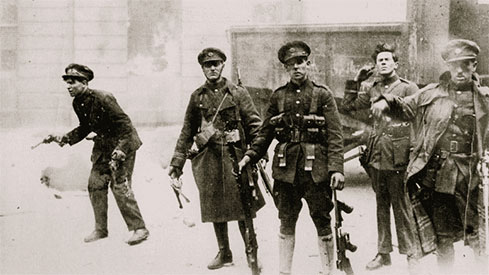HIU34545 Representing the Irish Revolution

- Module Coordinator:
- Dr Anne Dolan
- Duration:
- Michaelmas Term
- Contact Hours:
- 2 hours per week
- Weighting:
- 10 ECTS
- Assessment:
- 100% coursework (2 essays 40% and 60%)
A century later new sources are still emerging and shaping the way in which we write about and understand this period, but controversy and contestation have been part of how this period has been represented from the very outset. This module will chart the evolving interpretations of this period, beginning with representations from the period itself and moving on through the various historiographical, fictional, filmic and popular representations that followed. It will consider the various historiographical influences and political changes that have influenced our understanding of those years, along with the ways in which the Northern Irish Troubles and the revisionist debates have influenced the portrayal of these years.
The module will also ask whether the 1912-23 period has been adequately contextualised, adequately considered in terms of how revolution is defined, whether there has been an overemphasis on violence in the literature, or whether this period has come to dominate the narrative of twentieth century Irish history to the exclusion of other themes and issues, and how wider international context might change our conception of this period. This module will also address the relationship between the popular history of this period and academic analysis, and consider the tensions that have sometimes emerged between the two.

